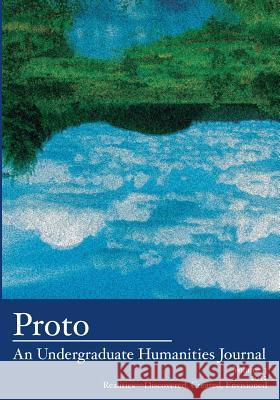Proto: An Undergraduate Humanities Journal, Vol. 3 2012 Realities-Discovered, Created, Envisioned » książka
Proto: An Undergraduate Humanities Journal, Vol. 3 2012 Realities-Discovered, Created, Envisioned
ISBN-13: 9781934074220 / Angielski / Miękka / 2013 / 94 str.
As with our first two issues, the third volume of Proto: An Undergraduate Humanities Journal features some of the finest writing and scholarship among undergraduate students in the Maryland and mid-Atlantic region. This year, as in the past, about half of the issue is devoted to the top papers from the annual Undergraduate Conference held at Stevenson University. Unfortunately, Stevenson University has decided to put the conference on indefinite hiatus. The journal will carry on despite this setback; we hope this disappointing news will not deter Proto's efforts to publish the insights and ideas of today's emerging scholars. As a sign of the journal's continuing development, we now have a website At www.protojournal.org, visitors can browse essays from previous years, download submission guidelines, contact members of the advisory board, find out more about our publisher-Loyola University's student-run Apprentice House Publishing-and link to ordering information for both current and back issues. We encourage you to visit the site. In this issue, readers should again be surprised and pleased with the style and erudition with which students engage a variety of themes. This year's Undergraduate Conference topic was "Realities-Discovered, Created, Envisioned." One of the most compelling presentations was by Tim Powling, whose essay describes the kind of friendship possible between a dog and a soldier at war. Callie Ingram artfully examines the complexities of communication in David Foster Wallace's labyrinthine novel Infinite Jest. Then we turn to Megan Franey, who argues that the dynamics of the possible realities of family and self are often best told through the stories we tell one another. Do we discover or create minds? How we answer this, writes Amanda Brenner in her lucid essay, points to contrasting approaches to the idea of artificial intelligence. In the Open Submissions section, Nathan Dennies focuses on two major writers, Wallace Stevens and Ernest Hemingway, in order to account for the significance of shifts in our consciousness. Edward Lasher presents an imaginative and fragmented reflection about a perplexing figure named Briley. And Christina Murphy concludes this issue with a scholarly analysis-in French-of the Spanish film La Vida Perra de Juanita Narboni. Each accepted admission is reviewed by at least two members on the editorial board, which consists of humanities professors from mid-Atlantic colleges and universities. Guidelines for submission are provided at the end of this issue as well as on the website. We hope you enjoy this issue, and we look forward to hearing from you. The Editors: Jean Lee Cole, Department of English, Loyola University Maryland; Alex Hooke, Department of Philosophy, Stevenson University











